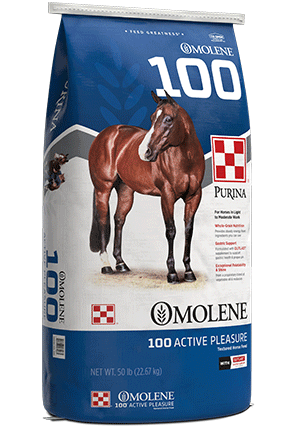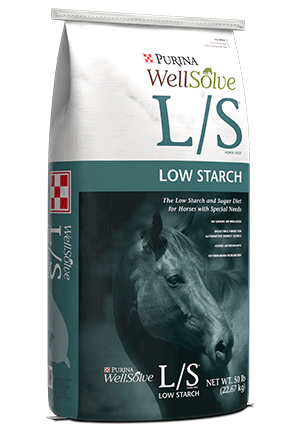
Feeding Basics for Horses, Miniature Horses and Ponies
Nutrition : General Nutrition

For horses, miniature horses and ponies to perform their best, they need the correct nutritional building blocks.
Just like people, all equines need protein, vitamins and minerals, as well as energy (calories) to support maintenance, growth, reproduction and work.
Hay and pasture need to be high quality for horses. The equine digestive tract does not handle poor quality forage efficiently, and very poor-quality forage may increase the risk of digestive problems.
The daily amount of hay and/or pasture fed is also a consideration. Horses, minis and ponies need at least 1-1.5 pounds of hay or pasture (on dry matter basis) per 100 pounds of body weight every day.
For example: a 300-pound miniature horse needs at least 3-4.5 pounds of hay per day or 9-13.5 pounds of pasture (fresh grass is much higher in water content) per day.
It’s common for horse owners to feed more than the minimum amount of forage recommended. Feeding more forage is fine as long as the total ration is balanced to provide optimal amounts of nutrients to meet the animal’s needs, including calories, protein, vitamins and minerals.
When fed free choice, forage intake may greatly exceed the minimum recommended amount. In those situations, it’s important to make sure individual animals do not become overweight, and to provide an additional source of nutrients to compensate for nutrient deficiencies in the forages.
There are many feeds to choose from to meet these additional nutrient needs. Most commercial feeds are fortified with protein, vitamins and minerals to appropriately complement forage and meet nutritional requirements.
Pelleted feeds include grains ground and mixed with other nutrient sources and ingredients and pressed into a pellet form. Corn, oats, wheat and wheat products and barley are common grains found in horse feeds, as well as some forages such as alfalfa and fiber sources including beet pulp.
When selecting a commercial feed, consider the needs of the animal. Some feeds are designed for performance, such as Ultium® Competition, Omolene® #200 and Omolene® #500 horse feeds. Some feeds are formulated for growth and breeding, such as Ultium® Growth and Omolene® #300 horse feeds.
Feeds formulated for maintenance or horses in light-moderate work include Omolene® #100 and Strategy® Healthy Edge® horse feeds. Older horses or seniors have their own formulations with Purina® Equine Senior® and Equine Senior® Active. Some feeds, such as Strategy® GX and Purina Miniature Horse & Pony feed, are formulated to support multiple lifestyles, including performance, growth and reproduction.
If your horse, mini or pony is an easy keeper or gains weight easily, it may be difficult to feed enough commercial fortified feed to provide adequate protein, vitamins and minerals without causing the horse to gain too much weight. In this instance, a concentrated feed or supplement may be best. These products, such as Purina Enrich Plus® ration balancing feed, contain concentrated amounts of nutrients and are formulated to feed in smaller meals, providing the horse with the proper nutrition without unwanted weight gain.
For overweight equines, some feeds are designed to help manage caloric intake and weight control. For some animals, using a grazing muzzle or eliminating pasture entirely and closely monitoring hay intake may be the only way to prevent obesity.
If you have access to a livestock scale, then it is easy to determine the exact weight. If not, you can use a body weight tape to estimate how much he or she weighs. Check with your Purina feed dealer for a Purina horse weight tape.
Most people measure feed using some sort of scoop. However, feeding directions indicate feed should be measured in pounds. The same volume of different feeds will weigh different amounts, so it is important to weigh the amount of feed that your scoop holds.
A simple way to do this is to use a digital fishing scale. Just put your scoop of feed in a bag or bucket, and hang it on the scale. Be sure to subtract the weight of the empty bucket! You can also weigh the hay to determine how much hay your horse is getting fed.
The scale ranges from a score of 1 (poor or extremely thin) to 9 (extremely fat). In general, horses and ponies should be a body condition score 5 (moderate). Looking from the side, if you cannot see ribs but can feel the ribs easily under the skin, the horse is approximately a body condition score 5.
With good care and nutrition, along with proper management and veterinary care, your horse, pony or miniature horse should be ready for you to enjoy for years to come.
Every horse is unique and so is their nutrition. Finding the right horse feeding program is paramount to helping your horse perform and feel the best. Find the right feed for your horse with our Feed Finder Tool.
Just like people, all equines need protein, vitamins and minerals, as well as energy (calories) to support maintenance, growth, reproduction and work.
Forage
In nature, horses spend most of their time eating – grazing grasses and other plants. When making feed choices, it’s important to start with the forage: pasture and/or hay. All equines need forage for calories and other nutrients, as well as fiber to help keep the digestive tract healthy. Insufficient fiber can lead to digestive problems such as colic.Hay and pasture need to be high quality for horses. The equine digestive tract does not handle poor quality forage efficiently, and very poor-quality forage may increase the risk of digestive problems.
The daily amount of hay and/or pasture fed is also a consideration. Horses, minis and ponies need at least 1-1.5 pounds of hay or pasture (on dry matter basis) per 100 pounds of body weight every day.
For example: a 300-pound miniature horse needs at least 3-4.5 pounds of hay per day or 9-13.5 pounds of pasture (fresh grass is much higher in water content) per day.
It’s common for horse owners to feed more than the minimum amount of forage recommended. Feeding more forage is fine as long as the total ration is balanced to provide optimal amounts of nutrients to meet the animal’s needs, including calories, protein, vitamins and minerals.
When fed free choice, forage intake may greatly exceed the minimum recommended amount. In those situations, it’s important to make sure individual animals do not become overweight, and to provide an additional source of nutrients to compensate for nutrient deficiencies in the forages.
Horse Feed Nutrients
Mature equines can often maintain their body weight and condition on the calories provided by hay or pasture alone. However, there are some necessary nutrients commonly lacking in forages, including some minerals in fresh pasture, or amino acids, vitamins and minerals in hay. Additionally, growing horses, broodmares and working horses usually need an additional source of calories.There are many feeds to choose from to meet these additional nutrient needs. Most commercial feeds are fortified with protein, vitamins and minerals to appropriately complement forage and meet nutritional requirements.
Commercial Horse Feeds
Commercial horse feeds are usually a sweet or “textured” feed or are pelleted. Sweet or textured feeds include a mixture of grains, some molasses and pellets containing vitamins and minerals.Pelleted feeds include grains ground and mixed with other nutrient sources and ingredients and pressed into a pellet form. Corn, oats, wheat and wheat products and barley are common grains found in horse feeds, as well as some forages such as alfalfa and fiber sources including beet pulp.
When selecting a commercial feed, consider the needs of the animal. Some feeds are designed for performance, such as Ultium® Competition, Omolene® #200 and Omolene® #500 horse feeds. Some feeds are formulated for growth and breeding, such as Ultium® Growth and Omolene® #300 horse feeds.
Feeds formulated for maintenance or horses in light-moderate work include Omolene® #100 and Strategy® Healthy Edge® horse feeds. Older horses or seniors have their own formulations with Purina® Equine Senior® and Equine Senior® Active. Some feeds, such as Strategy® GX and Purina Miniature Horse & Pony feed, are formulated to support multiple lifestyles, including performance, growth and reproduction.
If your horse, mini or pony is an easy keeper or gains weight easily, it may be difficult to feed enough commercial fortified feed to provide adequate protein, vitamins and minerals without causing the horse to gain too much weight. In this instance, a concentrated feed or supplement may be best. These products, such as Purina Enrich Plus® ration balancing feed, contain concentrated amounts of nutrients and are formulated to feed in smaller meals, providing the horse with the proper nutrition without unwanted weight gain.
For overweight equines, some feeds are designed to help manage caloric intake and weight control. For some animals, using a grazing muzzle or eliminating pasture entirely and closely monitoring hay intake may be the only way to prevent obesity.
How Much to Feed Your Horse
Once you have chosen the feed and forage source, the next step is to decide how much to feed. The feed label will provide guidelines for the amount to feed (remember: any individual animal may require a bit more or less than the suggested feeding rate), but you’ll need to know how much your horse, mini or pony weighs.If you have access to a livestock scale, then it is easy to determine the exact weight. If not, you can use a body weight tape to estimate how much he or she weighs. Check with your Purina feed dealer for a Purina horse weight tape.
Most people measure feed using some sort of scoop. However, feeding directions indicate feed should be measured in pounds. The same volume of different feeds will weigh different amounts, so it is important to weigh the amount of feed that your scoop holds.
A simple way to do this is to use a digital fishing scale. Just put your scoop of feed in a bag or bucket, and hang it on the scale. Be sure to subtract the weight of the empty bucket! You can also weigh the hay to determine how much hay your horse is getting fed.
Body Condition Scoring
To help determine if your horse is the appropriate weight for his or her size and frame, you can use the Body Condition Scoring system. Developed at Texas A&M University, the Body Condition Scoring system is an objective method to determine if your animal is thin, fat or just right.The scale ranges from a score of 1 (poor or extremely thin) to 9 (extremely fat). In general, horses and ponies should be a body condition score 5 (moderate). Looking from the side, if you cannot see ribs but can feel the ribs easily under the skin, the horse is approximately a body condition score 5.
With good care and nutrition, along with proper management and veterinary care, your horse, pony or miniature horse should be ready for you to enjoy for years to come.
Every horse is unique and so is their nutrition. Finding the right horse feeding program is paramount to helping your horse perform and feel the best. Find the right feed for your horse with our Feed Finder Tool.



